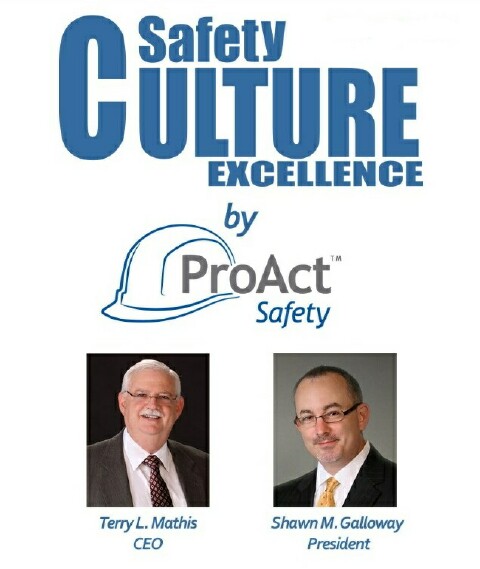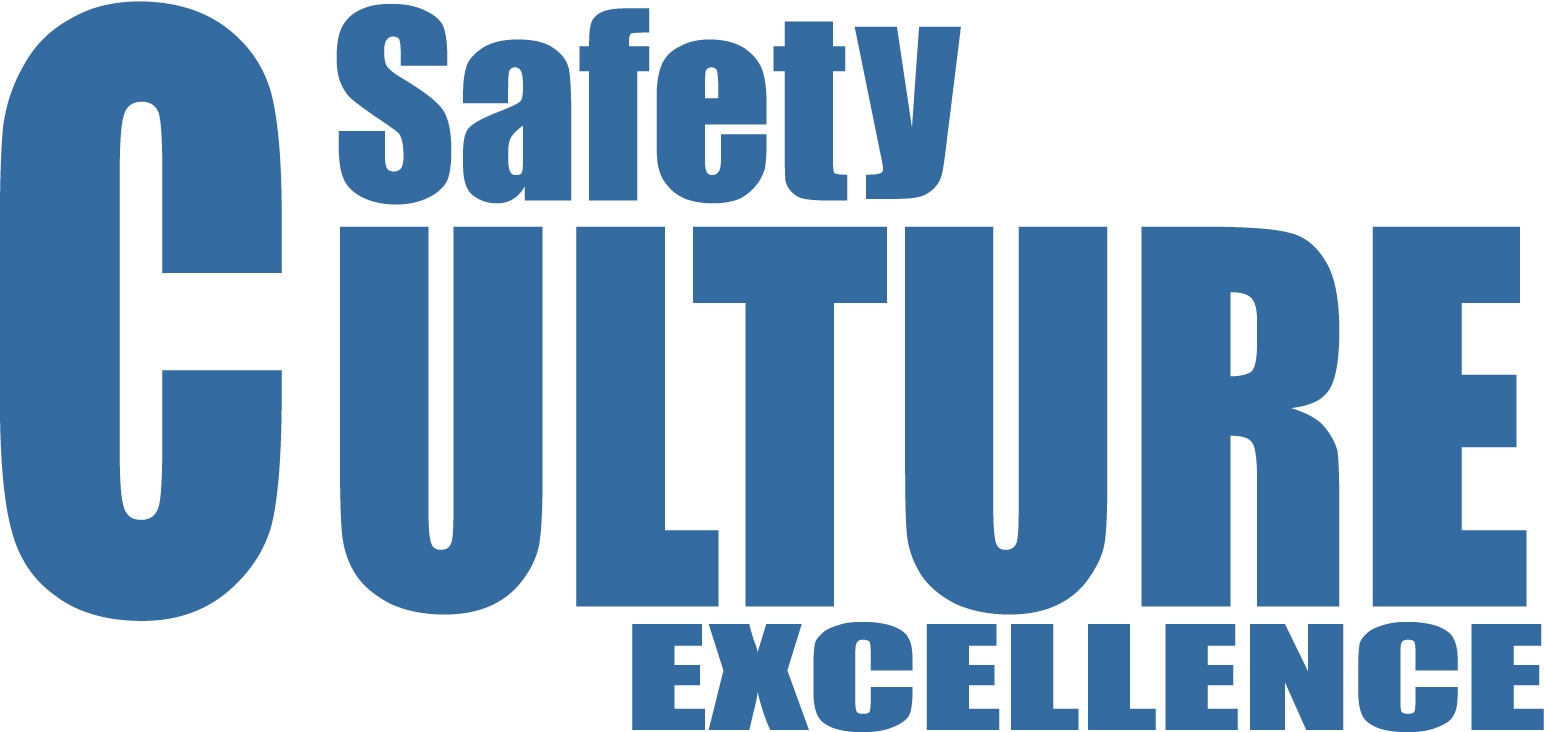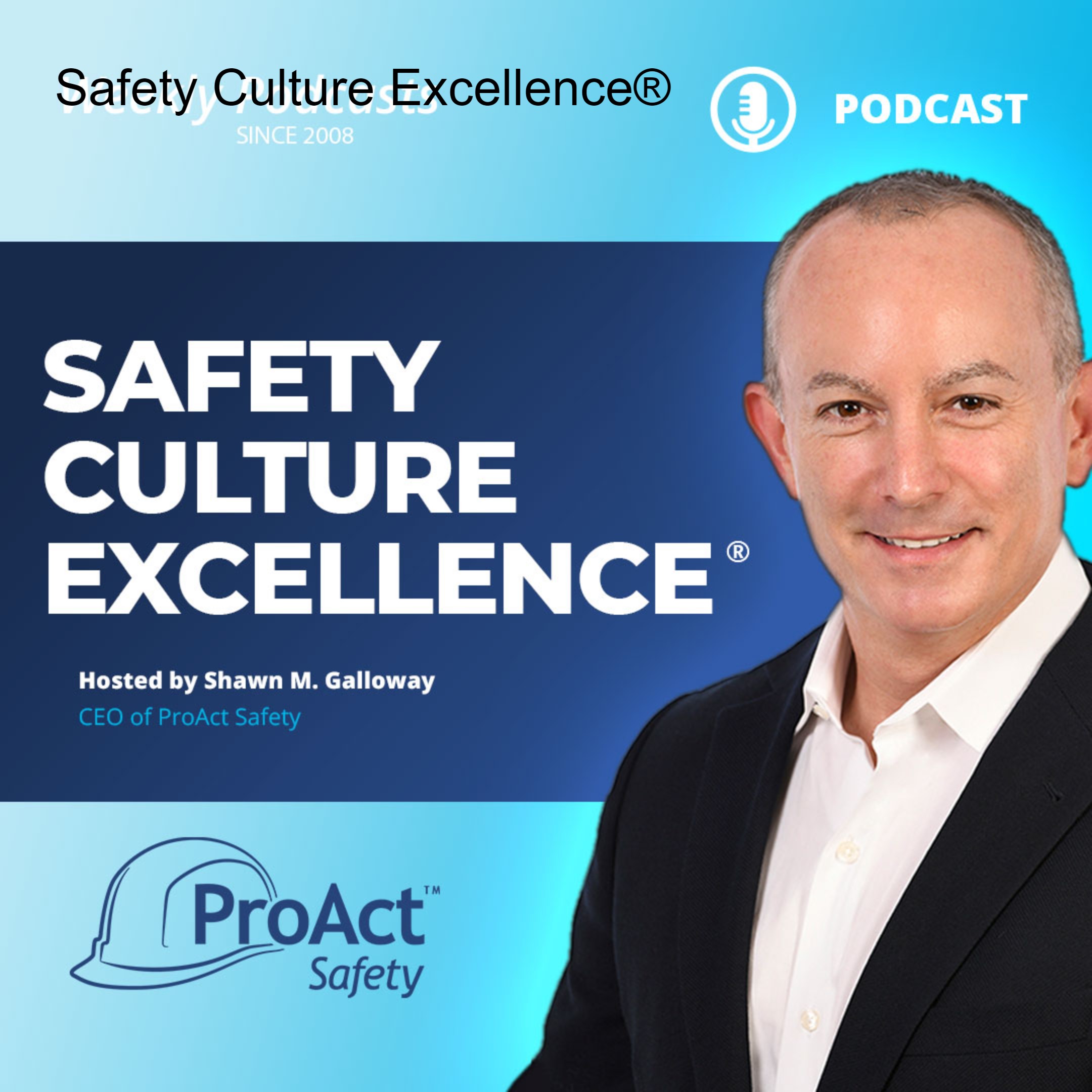Episodes

Monday Jul 28, 2014
347 - The Confrontation Calamity
Monday Jul 28, 2014
Monday Jul 28, 2014
Greetings everyone, this podcast recorded while in Toronto, ON. I’d like to share an article Terry Mathis wrote that was published June 2014 edition of EHS Today Magazine. The published article can either be found on the magazine’s website or under Insights at www.ProActSafety.com.
I hope you enjoy the podcast this week. If you would like to download or play on demand our other podcasts, please visit the ProAct Safety’s podcast website at: http://www.safetycultureexcellence.com. If you would like access to archived podcasts (older than 90 days – dating back to January 2008) please visit www.ProActSafety.com/Store. For more detailed strategies to achieve and sustain excellence in performance and culture, pick up a copy of our book, STEPS to Safety Culture Excellence - http://proactsafety.com/insights/steps-to-safety-culture-excellence
Have a great week!
Shawn M. Galloway
ProAct Safety

Monday Jun 30, 2014
343 - What is Your Safety Elevator Pitch?
Monday Jun 30, 2014
Monday Jun 30, 2014
Greetings everyone, this podcast recorded while in my home in Texas. I’d like to share an article I wrote that was published May 2014 in Professional Safety Magazine. The published article can either be found on the magazine’s website or under Insights at www.ProActSafety.com.
I hope you enjoy the podcast this week. If you would like to download or play on demand our other podcasts, please visit the ProAct Safety’s podcast website at: http://www.safetycultureexcellence.com. If you would like access to archived podcasts (older than 90 days – dating back to January 2008) please visit www.ProActSafety.com/Store. For more detailed strategies to achieve and sustain excellence in performance and culture, pick up a copy of our book, STEPS to Safety Culture Excellence - http://proactsafety.com/insights/steps-to-safety-culture-excellence
Have a great week!
Shawn M. Galloway
ProAct Safety

Wednesday May 28, 2014
Success vs. Vulnerability
Wednesday May 28, 2014
Wednesday May 28, 2014
The only problem with a successful safety effort is success. Success can seriously damage the organizational and individual sense of vulnerability necessary for future success. When no accidents happen for a long enough period of time, people can drop their guard. Celebrations of success that don’t include admonishments for renewed effort can lead to workers who are too busy patting themselves on the back to be safe. The age old, “it isn’t going to happen to me” mentality begins to grow and minds start to think their bodies are bulletproof.
Some of the best-performing organizations in safety are the ones where workers come to work each day with a full realization that accidents are possible and waiting. No one lowers their guard because they know the dangers are still there. There is a healthy respect for the possibility of a tragedy and everyone is standing guard to prevent it.
Vulnerability need not reach the panic level, but also cannot be allowed to go completely away, even for moments. Just like disease, accidents are best addressed through early detection and management of risk factors; not through reactive measures to control the damage. Can your organization celebrate success without losing its healthy sense of vulnerability?
-Terry L. Mathis
For more insights, visit www.ProActSafety.com
Terry L. Mathis is the founder and CEO of ProAct Safety, an international safety and performance excellence firm. He is known for his dynamic presentations in the fields of behavioral and cultural safety, leadership, and operational performance, and is a regular speaker at ASSE, NSC, and numerous company and industry conferences. EHS Today listed Terry as a Safety Guru in ‘The 50 People Who Most Influenced EHS in 2010, 2011 and 2012-2013. He has been a frequent contributor to industry magazines for over 15 years and is the coauthor of STEPS to Safety Culture Excellence, 2013, WILEY.

Monday Apr 21, 2014
338 – Creating a Culture of Have to or Want to?
Monday Apr 21, 2014
Monday Apr 21, 2014
Greetings everyone, this podcast recorded while in Clinton, IA. I’d like to share an article I wrote that was published April 2014 in BIC Magazine. The published article can either be found on the magazine’s website or under Insights at www.ProActSafety.com.
I hope you enjoy the podcast this week. If you would like to download or play on demand our other podcasts, please visit the ProAct Safety’s podcast website at: http://www.safetycultureexcellence.com. If you would like access to archived podcasts (older than 90 days – dating back to January 2008) please visit www.ProActSafety.com/Store. For more detailed strategies to achieve and sustain excellence in performance and culture, pick up a copy of our book, STEPS to Safety Culture Excellence - http://proactsafety.com/insights/steps-to-safety-culture-excellence
Have a great week!
Shawn M. Galloway
ProAct Safety

Wednesday Apr 16, 2014
The Confrontation Calamity
Wednesday Apr 16, 2014
Wednesday Apr 16, 2014
The emphasis on the concept of confrontation in safety is epidemic. Consultants, books and articles taut the virtue of teaching workers to confront each other over safety issues. They claim that the willingness and ability to confront may be the key competency of safety. They argue that it must become unacceptable to see a risk being taken and not confront the individual taking the risk.
The basis of this misguided concept goes back to two core misconceptions of safety thinking, (i.e. the idea that the goal of safety is to fail less and that all risk-taking is a matter of worker choice). When one worker sees another being bad there must be a confrontation to make the worker less bad. The worker taking a risk simply made a bad choice and confrontation will result in less-bad decisions in the future. The truth is that safety excellence is about achieving success, not simply avoiding failure and that there are organizational influences that impact workers’ decisions that need to be discovered and addressed if lasting change is to be made.
The alternative to the concept of confrontation is the concept of coaching. Coaching is a way to achieve success rather than simply avoid failure. It involves workers building on each other’s strengths rather than simply trying to correct their weaknesses. It is built upon a vision of success in which everyone helps each other reach a goal. It necessitates a vision of success and helps to identify organizational influences on workers’ behavioral choices.
Confrontation weakens relationships and culture and seldom results in lasting change. Coaching builds relationships and culture and almost always results in improved performance. Workers listen to their allies differently than they listen to their critics. Confrontation creates either enmity within the safety culture or avoidance behavior that has the appearance of confrontation without the reality. Either damages the very fabric of what it is supposed to improve.
-Terry L. Mathis
Terry L. Mathis is the founder and CEO of ProAct Safety, an international safety and performance excellence firm. He is known for his dynamic presentations in the fields of behavioral and cultural safety, leadership, and operational performance, and is a regular speaker at ASSE, NSC, and numerous company and industry conferences. EHS Today listed Terry as a Safety Guru in ‘The 50 People Who Most Influenced EHS in 2010, 2011 and 2012-2013. He has been a frequent contributor to industry magazines for over 15 years and is the coauthor of STEPS to Safety Culture Excellence, 2013, WILEY.

Monday Apr 14, 2014
337 – To Delegate or Not to Delegate Safety?
Monday Apr 14, 2014
Monday Apr 14, 2014
Greetings everyone, this podcast recorded while in Bangkok, Thailand. I’d like to share an article I wrote that was published April 2014 in OH&S Magazine. The published article can either be found on the magazine’s website or under Insights at www.ProActSafety.com.
I hope you enjoy the podcast this week. If you would like to download or play on demand our other podcasts, please visit the ProAct Safety’s podcast website at: http://www.safetycultureexcellence.com. If you would like access to archived podcasts (older than 90 days – dating back to January 2008) please visit www.ProActSafety.com/Store. For more detailed strategies to achieve and sustain excellence in performance and culture, pick up a copy of our book, STEPS to Safety Culture Excellence - http://proactsafety.com/insights/steps-to-safety-culture-excellence
Have a great week!
Shawn M. Galloway
ProAct Safety

Wednesday Apr 09, 2014
The Lost Art of Listening
Wednesday Apr 09, 2014
Wednesday Apr 09, 2014
The late Stephen Covey said that one of the habits of highly-effective people is to “Seek First to Understand, Then to Be Understood.” Most safety programs do exactly the opposite and are therefore not highly effective. Leaders and safety professionals decide what is needed and deploy new programs and processes without consulting the very people who know the issues in the field, and will ultimately determine the success or failure of new initiatives. Organizations regularly hire consultants to analyze their problems and the consultants get the information to do so directly from the organization’s employees. A good consultant is a good listener first and a good problem solver second.
But listening is more than just hearing sounds. It begins with setting the right tone for the conversation. There must be a non-threatening and respectful atmosphere in which the listening can take place. There also needs to be an honest and frank expectation of how the information will potentially be used. Skepticism often arises from past interviews or surveys from which no action has been taken. Enough of this kind of skepticism can render the conversation useless.
Sometimes, the right questions need to be asked to spark the right discussions and discover the underlying issues. When issues emerge from the discussions, they need to be probed and understood more fully. That means that the right questions need the right follow-up questions as well. The whole process can build upon itself once those interviewed realize that their input is being valued and can potentially lead to improvements. Listening is ultimately empowering people by taking them seriously.
-Terry L. Mathis
Terry L. Mathis is the founder and CEO of ProAct Safety, an international safety and performance excellence firm. He is known for his dynamic presentations in the fields of behavioral and cultural safety, leadership, and operational performance, and is a regular speaker at ASSE, NSC, and numerous company and industry conferences. EHS Today listed Terry as a Safety Guru in ‘The 50 People Who Most Influenced EHS in 2010, 2011 and 2012-2013. He has been a frequent contributor to industry magazines for over 15 years and is the coauthor of STEPS to Safety Culture Excellence, 2013, WILEY.

Monday Feb 17, 2014
328 - Caring More Deeply About Safety
Monday Feb 17, 2014
Monday Feb 17, 2014
Greetings everyone, this podcast recorded while in Clinton, TN. I’d like to share an article Terry L. Mathis wrote that was published January 2014 in EHS Today Magazine. The published article can either be found on the magazine’s website or under Insights at www.ProActSafety.com.
I hope you enjoy the podcast this week. If you would like to download or play on demand our other podcasts, please visit the ProAct Safety’s podcast website at: http://www.safetycultureexcellence.com. If you would like access to archived podcasts (older than 90 days – dating back to January 2008) please visit www.ProActSafety.com/Store. For more detailed strategies to achieve and sustain excellence in performance and culture, pick up a copy of our book, STEPS to Safety Culture Excellence - http://proactsafety.com/insights/steps-to-safety-culture-excellence
Have a great week!
Shawn M. Galloway
ProAct Safety

Monday Feb 03, 2014
327 - Applying the Three As of Employee Engagement
Monday Feb 03, 2014
Monday Feb 03, 2014
327 - Applying the Three As of Employee Engagement
Greetings everyone, this podcast recorded in my home in Texas. I’d like to share an article Terry L. Mathis wrote that was published December 2013 in EHS Today Magazine. The published article can either be found on the magazine’s website or under Insights at www.ProActSafety.com.
I hope you enjoy the podcast this week. If you would like to download or play on demand our other podcasts, please visit the ProAct Safety’s podcast website at: http://www.safetycultureexcellence.com. If you would like access to archived podcasts (older than 90 days – dating back to January 2008) please visit www.ProActSafety.com/Store. For more detailed strategies to achieve and sustain excellence in performance and culture, pick up a copy of our book, STEPS to Safety Culture Excellence - http://proactsafety.com/insights/steps-to-safety-culture-excellence
Have a great week!
Shawn M. Galloway
ProAct Safety

Wednesday Jan 15, 2014
The Danger of Relying on Awareness
Wednesday Jan 15, 2014
Wednesday Jan 15, 2014
Awareness is an important part of safety, but it is not the only part. Awareness is simply a step in the right direction that produces nothing without the other steps. Further, there are also two types of safety awareness: awareness of risks and awareness of how to manage those risks. So, when people say that safety is all about awareness, they are missing the big picture.
Consider the following illustration: Two people are traveling in a car and one is aware of the need for seat belts and the other is not. Neither of them buckle their seat belts. They have a head-on collision. Which person hits the windshield hardest, the person who is aware or the person who is not?
The true definition of safety includes two types of awareness and one type of action. Awareness of risks is first. In business we call this risk assessment. Awareness of the ways to address and reduce the risks is second and we call these mitigation and precautions. The third step is the action step. Awareness does not improve safety unless it results in action.
Leaders must mitigate risks where possible. Workers must take precautions where risks still exist. Failure to be aware results in inaction. But inaction can occur even with awareness and can render awareness inadequate to prevent accidents.
-Terry L. Mathis
Terry L. Mathis is the founder and CEO of ProAct Safety, an international safety and performance excellence firm. He is known for his dynamic presentations in the fields of behavioral and cultural safety, leadership, and operational performance, and is a regular speaker at ASSE, NSC, and numerous company and industry conferences. EHS Today listed Terry as a Safety Guru in ‘The 50 People Who Most Influenced EHS in 2010, 2011 and 2012-2013. He has been a frequent contributor to industry magazines for over 15 years and is the coauthor of STEPS to Safety Culture Excellence, 2013, WILEY.

